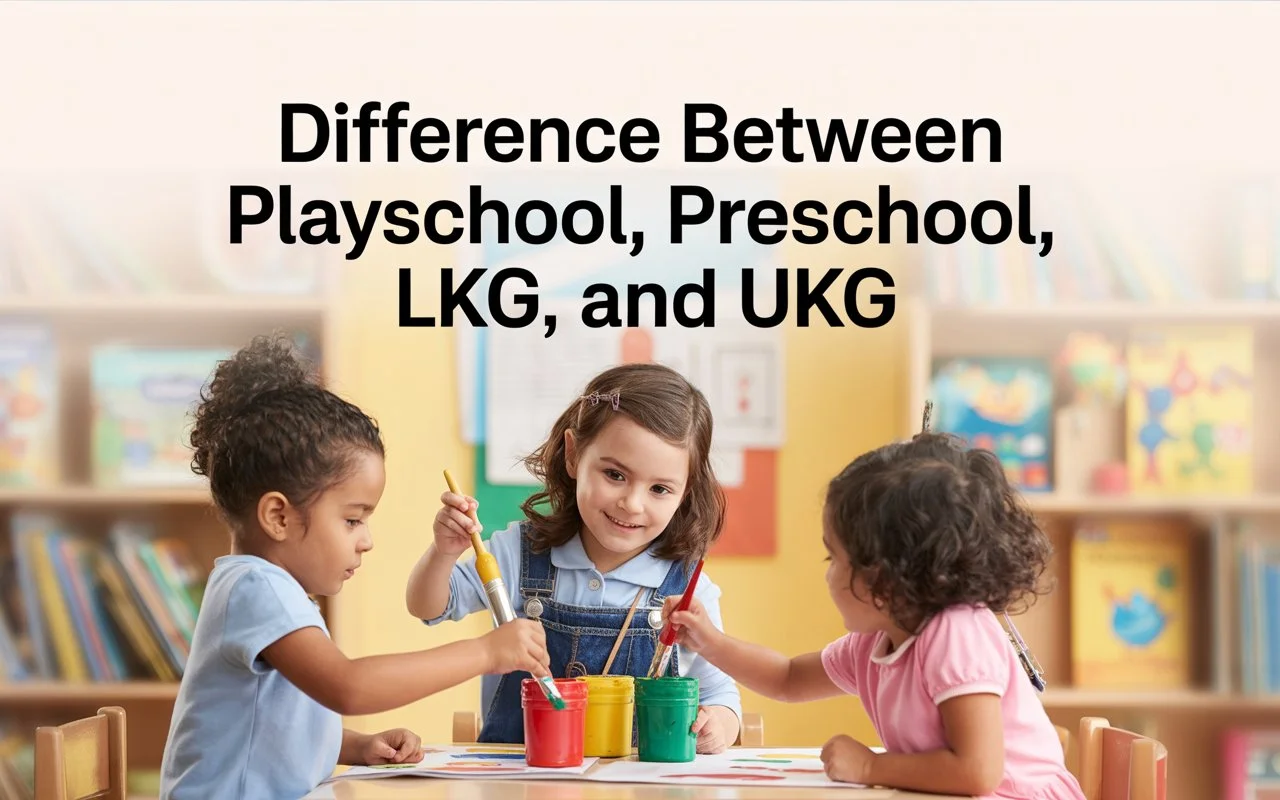Difference Between Playschool, Preschool, LKG, and UKG: A Complete Guide for Parents




For many parents, terms like playschool, preschool, LKG, and UKG can be confusing, especially if you’re sending your child to school for the first time. Each stage has its own purpose in a child’s development and plays a crucial role in building their academic and social foundation.
In this guide, we’ll explain:
A playschool is the first introduction your child gets to a group learning environment, usually between 1.5–3 years old.
It is less about academics and more about play-based learning.
Key Features of Playschool:
Preschool is the next step after playschool, usually for children aged 3–6 years.
It introduces basic pre-academic concepts through fun and engaging activities.
Key Features of Preschool:
LKG is for children around 3.5–4.5 years old and is the first formal step in the kindergarten system.
Here, children start structured learning in subjects like English, Maths, and General Awareness.
LKG Highlights:
Explore more about Interval’s LKG program, click the link below,
UKG is for children aged 4.5–5.5 years and acts as a preparatory class for Grade 1.
It strengthens the concepts learned in LKG and adds more advanced topics.
UKG Highlights:
Explore more about Interval’s UKG program, click the link below,
If you want to know more about, what lkg and ukg are, check out the blog
The early education stages (Playschool → Preschool → LKG → UKG) are designed to make the shift from home learning to formal schooling smooth and stress-free.
Stage | Skills Developed |
| Playschool | Socialization, following instructions, emotional adjustment |
| Preschool | Communication skills, curiosity, early number & letter recognition |
| LKG | Basic academics, fine motor skills, pre-writing & reading skills |
| UKG | Reading fluency, basic math operations, confidence in group learning |
When selecting a playschool, preschool, LKG, or UKG program, parents should look for:
To know more about the importance of Early childhood, check out the blog given below
With more parents choosing online education, LKG and UKG programs are now available virtually.
Benefits include:
Tip: Choose a program that keeps screen time healthy and includes offline activities.
At Interval Learning, we understand that every child’s learning journey is unique.
We offer:
Stage | Age Group | Main Focus | Learning Approach |
| Playschool | 1.5–3 yrs | Social skills, play-based learning | Free play, music, sensory activities |
| Preschool | 3–4 yrs | Pre-academics, listening skills | Storytelling, craft, songs |
| LKG | 3.5–4.5 yrs | Basic academics & motor skills | Structured learning + play |
| UKG | 4.5–5.5 yrs | Advanced basics & school readiness | Project-based, interactive learning |
At Interval Learning, we offer personalized online Kindergarten programs that combine academic basics with fun, interactive activities. Whether your child is just starting kindergarten or needs extra support, our one-on-one sessions ensure they learn at their own pace in a stress-free environment.
We provide:
Usually 3.5–4.5 years, depending on the school’s policy and your child’s readiness.
Not compulsory, but playschool helps children adjust to group learning.
Preschool focuses on early social and cognitive development, while LKG introduces structured academics.
Yes, in most education boards, UKG is the final stage before entering Class 1.